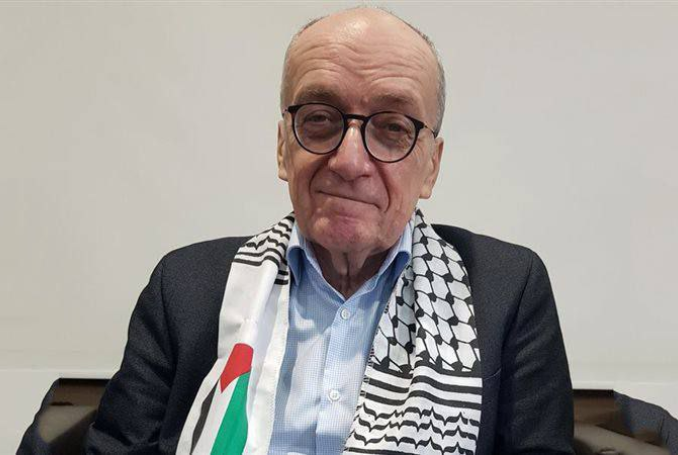illes Duvier, the French Lawyer Who Stood for Palestine – Profile

“Now I can die in peace,” Duvier is reported to have told his son back in May, after the ICC’s chief prosecutor, Karim Khan, had officially requested the issuance of arrest warrants for Netanyahu and Gallant.
French lawyer, Gilles Duvier, who passed away this past Tuesday was the man who paved the way towards the ICC’s issuance of its arrest warrants for Israeli Prime Minister Benjamin Netanyahu and his former defense minister Yoav Gallant.
Born on September 4, 1956, in France’s Lyon, Gilles Duvier spent much of his adult life working towards human rights causes and paid particular focus to the issues of Palestine and Western Sahara. He worked as a lawyer at the Bar Association in the French city of Lyon and was also a lecturer at the Faculty of Law at the University of Lyon.
Despite his being known as a lawyer, Duvier pursued this career path late in life and originally had studied to become a nurse. His work, pertaining to rights issues, spanned more than 30 years, extending across the fields of health, social rights and minority advocacy in France and around the world.
The French lawyer can be said to have been the first to bring the Palestinian case to the International Criminal Court (ICC) in 2009. Duvier acted as the spokesperson for a grouping of over 350 NGOs, alongside 40 lawyers, who handled the request for the ICC to adjudicate the war crimes committed during Israel’s war on Gaza in 2008/9. This applied pressure to not only the Israelis and the court but also encouraged the Palestinian Authority to seek membership.
The war crimes case against Israel, which was eventually brought before the court following Israel’s much deadlier assault on the Gaza Strip in 2014, would end up being the battle that would ultimately lead to the March 2021 declaration that the ICC would investigate Israeli war crimes. It was again Gilles Duvier who filed that complaint following the 51-day war in which the Israeli military had murdered over 2,320 Palestinians.
In 2015, this legal effort and campaign, spearheaded by Duvier, succeeded in influencing the State of Palestine to sign the Rome Statute that governs the ICC. The court then entered a long process that resulted in them deciding that, despite Israel’s refusal to sign the Rome Statute, the ICC did have jurisdiction over the territory and could therefore potentially issue arrest warrants.
In 2018, he also represented victims of Israeli sniper fire who were injured during what was known as the Great Return March. The mass non-violent protest movement began on March 30, 2018, and resulted in Israeli snipers shooting dead around 300 Palestinian civilians and injuring over 35,000. Guvier presented some 3,000 files in pursuit of justice for the Palestinian victims.
The recent arrest warrants for Netanyahu, Gallant, and Hamas military leader Mohammed Deif, were far from analogous to the ICC’s process of issuing its arrest warrant for Russian President Vladamir Putin; which had been a very speedy process.
Instead, the lead-up to the decision recently made by the court’s judges has to be viewed as the result of a long panned-out process, over the course of around 15 years, which paved the way to being able to hold Israel accountable at The Hague.
“Now I can die in peace,” Duvier is reported to have told his son back in May, after the ICC’s chief prosecutor, Karim Khan, had officially requested the issuance of arrest warrants for Israeli Prime Minister, Benjamin Netanyahu, and former defense minister Yoav Gallant.
As Duvier suffered through a bout of intense illness over the course of the following 6 months, the decision of the ICC’s judges emerged on November 21 and confirmed the issuance of the arrest warrants, the French lawyer passed away less than a week later, as if this was the news he needed to hear before his death.
The French lawyer had suffered from health complications for some time and it was reported that back in 2021, when he was about to undergo serious and potentially life-threatening surgery, only hours earlier he was discussing “the file of the Sheikh Jarrah neighborhood in East Jerusalem was the last thing he talked about.”
On the issue of Palestine, Gilles Duvier remarked that he sought to “raise an army of lawyers, for a country without an army.” He managed to live just long enough to watch one of the most important legal battles of his life, and perhaps on the planet, finally, bear fruits.
(The Palestine Chronicle
